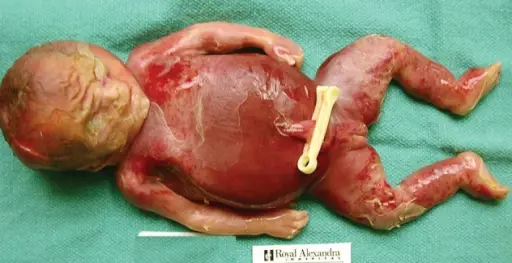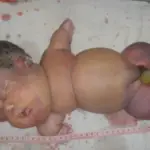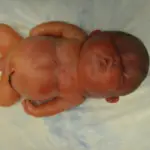Immune hydrops is hemolytic disease caused by incompatibility between blood group antigens of mother and fetus.
What is the Pathology of Immune Hydrops?
The pathology of immune hydrops is:
–Etiology: The cause of immune hydrops is complication of a severe form of Rh incompatibility. This is a condition in which mother who has Rh negative blood type makes antibodies to her baby’s Rh positive blood cells, and the antibodies cross the placenta.
-Genes involved: Rh incompatibility.
–Pathogenesis: The sequence of events that lead to immune hydrops is hemolysis caused by the Rh incompatibility. This results in extramedullary hematopoiesis in the fetal liver and bone marrow. The push to make more erythroblasts to help compensate with the hemolysis over works the liver causing hepatomegaly. The resulting liver dysfunction decreases albumin output which in turn decreases oncotic pressure. Consequentially, the decrease in oncotic pressure results in overall peripheral edema and ascites.
–Morphologic changes: The morphologic changes involved with immune hydrops are hemolysis of fetal red blood cells causing severe anemia.
How does Immune Hydrops Present?
Immune hydrops does not have a gender predisposition. Immune hydrops typically presents between 3 months to 5 months of age. The symptoms, features, and clinical findings associated with immune hydrops include severe swelling, enlarged liver, enlarged spleen, enlarged heart thickened placenta, and polyhydramnios. Immune hydrops is associated with still birth, preterm birth, heart failure, and breathing difficulties.
How is Immune Hydrops Diagnosed?
Immune hydrops is diagnosed by radiology, and obstetric physicians.
How is Immune Hydrops Treated?
Immune hydrops is treated by direct transfusion of red blood cells that match the infant’s blood type. An exchange transfusion to rid the baby’s body of the substances that are destroying the red blood cells is also done. The goal is to remove extra fluid from around the lungs and abdominal organs with a needle.
What is the Prognosis of Immune Hydrops?
The prognosis of immune hydrops is poor. Immune hydrops may result in death.



